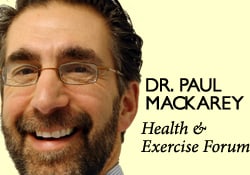
It is a well established fact in the medical literature that the benefits of a healthy diet, regular exercise and physical activity are numerous, from reducing blood pressure to lowering the risk of falls. (SEE BOX A Below) However, a study recently published in journal Neurology, reported that a healthy diet along with regular aerobic exercise may also improve brain health and improve cognitive tests, even in those already showing signs of an aging brain. Prior to these new findings, it was unclear if this healthy behavior initiated later in life would reverse signs of an already aging brain when compared to those following a poor diet and sedentary lifestyle.
Researchers observed 160 subjects over the age of 55 who began showing signs of a slowing brain similar to people in their 90s, which was an average of 28 years older than their actual age. All subjects were sedentary at the time of the study, had at least one risk factor for heart-disease and showed signs of cognitive decline, without any signs of dementia.
The subjects were divided into one of four groups; Group one participated in aerobic exercise; Group two followed a healthy diet; Group three followed a healthy diet and participated in aerobic exercise; Group four only participated in education sessions about improving brain health but did not alter their diet or engage in exercise.
Aerobic exercise in this study was defined as three months of supervised physical activity at a research facility in which subjects attained 70% of their peak heart rates on a treadmill or stationary bike three times a week. Diet in this study was defined as the Dietary Approaches to Stop Hypertension (DASH) which emphasizes reducing salt and increasing fiber to control blood pressure and improve heart health.
The results found improvement only in group three, the healthy diet and aerobic exercise group, who improved their scores by nine years. The control group continued to decline in brain function while the exercise only and diet only groups did not show signs of improvement.
In this study, people who followed the DASH diet and performed aerobic exercise for no less than 30 minutes, three times per week at a 70% peak heart rate for three months improved their performance on cognitive tests. Moreover, in those with evidence of cognitive impairment, it is not too late to derive benefits from a healthy diet and aerobic exercise. These results reinforce previous research that supports the fact that heart health promotes good circulation throughout the body and brain, which is important for maintaining oxygen-rich blood to fuel its activities, including cognition.
Aerobic exercise was strictly defined in this study but should not intimidate those interested in exercise. In a broader sense, aerobic exercise is any type of sustained exercise that strengthens the heart and lungs to improve the body’s use of oxygen. This may include running/jogging, brisk walking, cycling, swimming, rowing, and the use of a treadmill, elliptical, stepper or similar device, at light to moderate intensity which requires the use of oxygen to adequately meet the oxygen demands of the body for an extended period of time. The generally accepted time and frequency is at least 30 minute sessions performed three or more times per week. For those with back, hip, knee and other lower body pain, consider low-impact or partial weight-bearing activities such as a recumbent bike or stepper or upright bike instead of a treadmill.
For More Information: Dietary Approaches to Stop Hypertension (DASH) – National Heart, Lung, and Blood Institute at National Institutes of Health.
BOX A:
Some of the more important benefits of exercise are:Loss or Maintained Body Weight
Reduces LDL /Raises HDL Cholesterol
Reduces risk of type II diabetes
Improves Circulation and Blood Pressure
Reduces Risk of Heart Disease
Prevents Bone Loss
Reduces Stress/Muscle Tension
Lowers Risk of Depression
Improves Sleep Pattern
Improves Strength and Flexibility
Improves Balance/Reduces Risk of Falls
Improves Immune System
Improves Pain Threshold
Stimulation of Neurogenesis (formation of new brain cells)
Visit your doctor regularly and listen to your body.
Keep moving, eat healthy foods, exercise regularly, and live long and well!
NEXT MONDAY – Read Dr. Paul J. Mackarey “Health & Exercise Forum!”
This article is not intended as a substitute for medical treatment. If you have questions related to your medical condition, please contact your family physician. For further inquires related to this topic email: drpmackarey@msn.com
Paul J. Mackarey PT, DHSc, OCS is a Doctor in Health Sciences specializing in orthopaedic and sports physical therapy. Dr. Mackarey is in private practice and is an associate professor of clinical medicine at The Commonwealth Medical College.